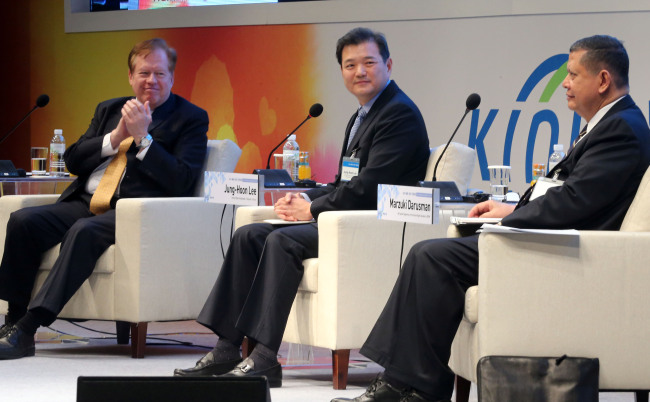With North Korea showing signs of change following a milestone U.N. report, the world should continue to heap pressure on the communist regime to improve its human rights record, a panel said Thursday.
Dozens of policymakers, experts and activists around the world discussed the current human rights situation in North Korea and ways to generate practical improvement at the 4th Chaillot Human Rights Forum hosted in Seoul by the state-run Korea Institute for National Unification.
Among the key speakers were Marzuki Darusman, the U.N. special rapporteur on human rights in North Korea; Robert King, the U.S. special envoy for North Korean human rights issues; Lee Jung-hoon, Seoul’s ambassador for human rights; and Park Jin, a former lawmaker who is currently executive president of the private Asia Future Institute.
The participants noted the significance of the U.N. Commission of Inquiry report released in February in prompting Pyongyang to wage its own campaign to defend its human rights record through diplomatic activities and documents.
The bombshell paper by the Commission of Inquiry detailed “systematic, widespread and gross” human rights breaches in the reclusive country which constitute crimes against humanity, calling for the offenders including leader Kim Jong-un to be brought to an international criminal justice mechanism.
“In the past the North Koreans largely ignored human rights. ... With the publication of the report of the COI, the North Koreans have suddenly become much more concerned about human rights, and much more aggressive in terms of fighting against what’s going on with the COI and the U.N.,” King said.
 |
Marzuki Darusman (right), the U.N. special rapporteur on human rights in North Korea; Robert King (left), the U.S. special envoy for North Korean human rights issues; and Lee Jung-hoon, Seoul’s ambassador for human rights, take part in the fourth Chaillot Human Rights Forum hosted Thursday in Seoul by the state-run Korea Institute for National Unification. (Yonhap) |
“I think the most important part is that North Koreans’ actions legitimize human rights as an issue of international concern, that in fact human rights in one country is not a matter for that exclusive country.”
Lee, who also teaches international studies at Yonsei University in Seoul, said the report is creating a “paradigm shift” in the way the international community deals with human rights issues.
“What’s amazing is that for nearly seven decades, North Korea somehow has been able to divert international pressure and attention,” he said.
“It seems that we’ve finally found one area that really hurts North Korea. They’re extremely sensitive about this issue. That’s a positive sign, since they’re trying to do something about that.”
North Korea has in recent months been ramping up diplomatic efforts to water down the language of a resolution on its human rights situations, which was chiefly authored by the European Union and is slated to be put to a vote next week at a U.N. panel. The draft urges actions to address the dismal living conditions there in line with the recommendations of the COI paper.
During an unprecedented meeting with senior North Korean officials two weeks ago in New York, Darusman was asked to remove two sensitive clauses in the resolution, which are related to the accountability of the supreme leader and a possible referral to the International Criminal Court. In return, they offered a visit to Pyongyang, he said.
But he stressed the need to simultaneously pursue cooperation and accountability ― or pressure and scrutiny ― to induce the regime to change course in earnest.
“The international community must adopt a common and effective strategy. It should review carefully targeted actions and engagement by all relevant mechanisms,” the former Indonesian prosecutor general said.
“With our combined efforts, a meaningful change can be made possible. I firmly believe the international community should seize this unique opportunity and momentum … to help make differences in the lives of the people of North Korea, including (the) victims, and to ensure accountability for those responsible for serious violations of human rights.”
By Shin Hyon-hee (
heeshin@heraldcorp.com)








